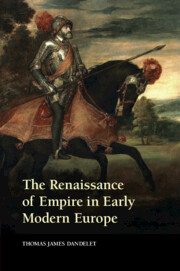Book contents
- Frontmatter
- Contents
- List of illustrations and maps
- Acknowledgments
- Introduction
- 1 The Rebirth of the Caesars
- 2 The Return of Caesar: The Hybrid Empire of Charles V, 1517 to 1556
- 3 The Spanish Empire, Apex of the Imperial Renaissance
- 4 The Renaissance of Empire in France
- 5 Britain as Late Renaissance Empire
- Conclusion
- Select Bibliography
- Index
- References
Introduction
Rome Was
Published online by Cambridge University Press: 05 June 2014
- Frontmatter
- Contents
- List of illustrations and maps
- Acknowledgments
- Introduction
- 1 The Rebirth of the Caesars
- 2 The Return of Caesar: The Hybrid Empire of Charles V, 1517 to 1556
- 3 The Spanish Empire, Apex of the Imperial Renaissance
- 4 The Renaissance of Empire in France
- 5 Britain as Late Renaissance Empire
- Conclusion
- Select Bibliography
- Index
- References
Summary
Consider Rome, our common fatherland, our mother: she lies there – O shameful spectacle! – trampled by all whom she, the conqueror of all lands and seas, once trampled.
Francesco Petrarch, Letters on Familiar Matters, trans. Aldo S. Bernardo (New York: Italica Press, 2005)In 1341, Francesco Petrarca, the most important early intellectual protagonist of the Renaissance in Europe, traveled to Rome at the invitation of the city’s Senator to accept the honor of the poet’s laurel wreath. This imagined revival of the ancient Roman ritual honoring the best poets was both an acknowledgment of Petrarch’s early literary fame and an act of faith in his future for the poet and his powerful patron. At the age of thirty-seven he had written many celebrated sonnets in Italian, a number of Latin poems that demonstrated a rare Ciceronian Latinity, and he was at work on Africa, his great epic in the manner of the Latin poets. His studies of ancient authors and his Latin letters imitating their style were all the more intense and provocative because he and his patrons increasingly acknowledged that the grandeur of ancient Rome was a distant memory.
The Capitoline Hill where the prize was given made this abundantly clear as it looked out over the ruins of the ancient Roman forum. Once the monumental center of the Roman Republic and Empire, graced by temples, basilicas, triumphal arches, the Senate house, and many statues honoring the gods and emperors, the forum in Petrarch’s time had been reduced to a place of smoking lime pits, grazing cows, and the ruins of Rome’s former glory. The ancient center of Rome, still the location of a modest twelfth-century palace that housed the office of the Senator, stood isolated from the main population center of the city surrounding the forum. The largest metropolis of the ancient world when it boasted an estimated population of 1 million, Rome had been reduced to a large town of roughly 30,000 people by the time of Petrarch’s visit. In an earlier letter to Pope Benedict XII from late 1334 or early 1335, Petrarch expressed the melancholy sentiment evoked by the decline of the ancient capital with the poignant lament: “Meanwhile in murmur sad the words rang forth: Rome was.”
- Type
- Chapter
- Information
- The Renaissance of Empire in Early Modern Europe , pp. 1 - 17Publisher: Cambridge University PressPrint publication year: 2014



